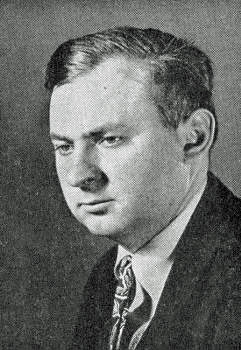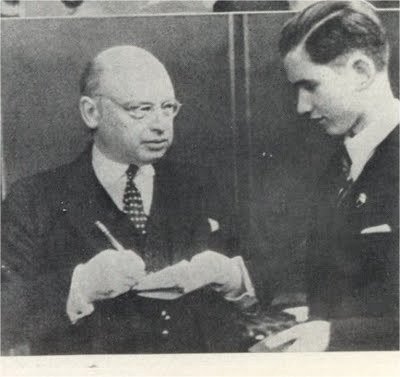Rivals
Once Capablanca and Alekhine were friends, today they are bitter enemies. At the 1914 tournament in St. Petersburg they often analysed together, at the 1938 AVRO tournament they no longer talk to each other.
One reason for this enmity is their World Championship match from 1927, which was played in Buenos Aires. Capablanca was clear favourite, but Alekhine surprisingly won the match 18½-15½. Alekhine won six games, Capablanca three, 25 games ended in a draw and Alekhine was the new World Champion.
Since then Capablanca has hoped for a rematch, but Alekhine never wanted to grant him one. Alekhine also avoided Capablanca in tournament chess. The first game they played after Buenos Aires 1927 was in Nottingham 1936 and this encounter ended in favour of Capablanca. In fact, before the AVRO Tournament 1938 Alekhine has never won a tournament game against Capablanca.
The game between Capablanca and Alekhine in the second round of the AVRO tournament ended in a draw, but in round nine Alekhine scored a convincing victory over his old rival. In order to keep contact with Capablanca to a minimum, Alekhine had waited outside the tournament hall until the round had begun, and only then sat down at the board.
The game itself was surprisingly one-sided. Capablanca tried the French Defense but quickly went astray and wound up in a bad position with hardly any counterplay. Alekhine gradually increased the pressure and Capablanca's desperate attempt to free himself himself only cost him material. In a lost position Capablanca did not want to resign but preferred to lose on time.
If Alekhine and Capablanca continue to avoid each other in tournaments, then this might well have been the last game the two will ever play against each other. With 9-7 and 33 draws the overall record is in favour of Capablanca, but this is of course little consolation for the Cuban, who suffered the six most important losses of his career against Alekhine in Buenos Aires 1927.
Reuben Fine started the AVRO Tournament with 5½ out of 6 but then lost to Keres in round 7 and he still doesn't seem to have recovered from that defeat.

Reuben Fine: Author, psychologist and one of the world's best chess players
From 1935 to 1937 Fine played numerous tournaments in Europe and in 1937 he helped Euwe as a second in his World Championship rematch against Alekhine. But afterwards Fine returned to the USA with his Dutch wife to work as a psychologist. No wonder he likes to refer psychology to find reasons for good or bad play. He also explained his winning streak at the beginning of the AVRO tournament in this way:
"It is hard to pin down precisely the factors which make for a winning or a losing streak in any sport. In the first half of the AVRO tournament I played as one possessed. Subjectively there were two reasons for this. One was that I had just finished the manuscript of Modern Chess Openings and was extremely well prepared in the openings. The other was that I had decided to give up full-time chess and finish my studies. Ironically I had even asked the organizers to release me from my contract to play, but they had declined to do so. This allowed me to discard some of the excessive caution which at times had held me back before."
However, in his game against Reshevsky, Fine did not seem to be extremely well prepared in the opening. In the intricacies of a Spanish he quickly lost a pawn for which he did not have any compensation.
But then Fine defended tenaciously while Reshevsky did not play energetically enough but when the position was finally close to a draw Fine lost on time.
Fine also offered a psychological explanation for the course of this game and the special nature of his games with Reshevsky:
"Reshevsky and I competed together in a large number of tournaments, both European and American. Although we played on a par with the best of that time our games displayed a fantastic series of blunders. Either he rescued a lost position against me, or I did against him. Nor were these subtle mistakes; many of them were so obvious that the rankest amateur could have seen them. Psychologists can point to many other life situations where a similar seesaw can be found. It is explained as a manifestation of the eternal human problem of ambivalence. Each wanted to beat the other, yet unconsciously each was reluctant to do so."
However, this may be, this loss cost Fine the lead and with 6.0/9 and five rounds to go he now shares first place with with Keres.
Against Botvinnik Keres played a strategically interesting game with Black that ended in a hard-fought draw.

Savielly Tartakower, who works as journalist at the AVRO tournament, interviews Paul Keres.
Flohr and Euwe drew in a less exciting fashion.
Results of round 9
A. Alekhine 1-0 J.R. Capablanca
R. Fine 0-1 S. Reshevsky
M. Botvinnik ½-½ P. Keres
S. Flohr ½-½ M. Euwe
Standings after round 9
Games
Links
.jpeg)
























